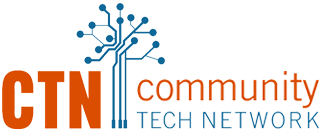January is Poverty Awareness Month. At Community Tech Network, we believe that when discussing poverty, one must also address digital redlining.
Internet service providers, or ISPs, often intentionally underinvest in low-income, minority communities, assuming that they will earn larger profits in wealthier, whiter neighborhoods. In such cases, low-income areas have less digital infrastructure and slower internet speeds.
According to research published in October 2022, residents of one low-income neighborhood in New Orleans had internet speeds that were 400 times slower than those of a nearby affluent part of the city. Yet, both groups were paying the same price for internet service!

This discriminatory practice is known as digital redlining.
The history of the term “redlining” dates back to the post-Depression era, in which policy makers literally created maps that marked “risky” (i.e., non-white) areas in which minority residents would be denied mortgages. Unable to purchase their own homes, many families remained trapped in cycles of poverty.
Similarly, digital redlining prevents upward economic mobility.
As technology use increases, digital access has become key to economic success. Without high-speed home internet, or broadband, millions of low-income students are unable to complete their homework assignments, preventing them from potentially receiving high marks. Currently, about 4.5 million Black students in grades K-12 lack high-quality broadband at home.
Without high-speed Internet, folks are also unable to participate in the digital economy. According to a report (PDF) from the Harvard Kennedy School’s Belfer Center:
“There is a direct correlation between the digital divide and income inequality. For digital citizens … technology accelerates earning power and career opportunities. Both are critical for transforming income into wealth. Conversely, those with marginal to no connectivity have significantly different economic outcomes and frequently rely on manual labor or jobs that pay lower wages.”
Clearly, digital redlining is designed to keep the poor poor.
So what can be done?
Some experts argue that states and the Federal Communications Commission (FCC) should ban digital redlining. After all, home mortgage redlining is already illegal. However, even if digital redlining is criminalized, low-income communities will still suffer from inadequate digital infrastructure given years of underinvestment.
Some think that federal assistance is needed to fill the digital gaps. The Digital Equity Act, which was recently signed into law, is a step in the right direction. It will provide states, territories, and tribal lands $2.75 billion to address digital inclusion.
One thing we can all do is raise our voices. We can call out digital redlining for what it is: discriminatory.
This Poverty Awareness Month, spread the word. Stand up and speak out against digital redlining.
Photo: The Markup, 2022


Comments are closed.